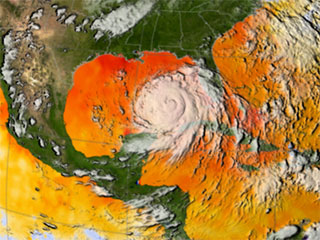2005 Atlantic hurricane season worst on record
NOAA release
November 29, 2005
The
2005 Atlantic hurricane season is the busiest on record and extends
the active hurricane cycle that began in 1995 — a trend likely
to continue for years to come. The season included 26 named storms,
including 13 hurricanes in which seven were major (Category 3 or higher).
“This
hurricane season shattered records that have stood for decades —
most named storms, most hurricanes, and most category five storms.
Arguably, it was the most devastating hurricane season the country
has experienced in modern times,” said retired Navy Vice Adm.
Conrad C. Lautenbacher,
Jr., Ph.D., under secretary of commerce for oceans and atmosphere
and NOAA administrator. “I’d like to foretell that next
year will be calmer, but I can’t. Historical trends say the
atmosphere patterns and water temperatures are likely to force another
active season upon us.”
The
Atlantic Basin is in the active phase of a multi-decadal cycle in
which optimal conditions in the ocean and atmosphere, including warmer-than-average
sea-surface temperatures and low wind shear, enhance hurricane activity.
This increase in the number and intensity of tropical storms and hurricanes
can span multiple decades (approximately 20 to 30 years). NOAA will
make its official 2006 season forecast in May, prior to the June 1st
start to the season.
“Evidence
of this active cycle was demonstrated this year as the Atlantic Basin
produced the equivalent of more than two entire hurricane seasons
over the course of one. Because we are in an active hurricane era,
it’s important to recognize that with a greater number of hurricanes
comes increasing odds of one striking land,” said retired Air
Force Brig. Gen. David
L. Johnson, director of NOAA’s National Weather Service.
Records
set this season include the totals for:
-
Named
storms: 26; previous record: 21 in 1933 -
Hurricanes: 13; previous record: 12 in 1969 -
Major
hurricanes hitting the U.S.: Four (Dennis, Katrina, Rita and Wilma);
previous record: Three, most recently in 2004 -
Hurricanes
of Category 5 intensity (greater than 155 mph): Three (Katrina,
Rita and Wilma); previous record: Two in 1960 and 1961
NOAA
scientists predicted this would be an extremely active hurricane season,
forecasting near-record activity in early August. The 26 named storms
topped the forecast range of 18 to 21, the 13 hurricanes inched above
the forecast of nine to 11 and the seven major hurricanes fell within
NOAA’s forecast range of five to seven. Five hurricanes (Dennis,
Katrina, Ophelia, Rita and Wilma) and three tropical storms (Arlene,
Cindy and Tammy) directly impacted the U.S.
 Warm ocean waters fuel hurricanes, and there was plenty of warm water for Katrina to build up strength once she crossed over Florida and moved into the Gulf of Mexico. This image depicts a 3-day average of actual sea surface temperatures (SSTs) for the Caribbean Sea and the Atlantic Ocean, from August 25-27, 2005. Every area in yellow, orange or red represents 82 degrees Fahrenheit or above. A hurricane needs SSTs at 82 degrees or warmer to strengthen. The data came from the Advanced Microwave Scanning Radiometer (AMSR-E) instrument on NASA’s Aqua satellite. The GOES satellite provided the cloud data for this image. Image Credit: NASA/SVS Related articles Hurricane Katrina damage just a dose of what’s to come Number of category 4 and 5 hurricanes has doubled over 35 years Hurricanes getting stronger due to global warming says study |
Letters
of the Greek alphabet were used to name storms for the first time
since storms began acquiring names in 1953, as Hurricane Wilma exhausted
the original list of 21 names. Tropical Storm Alpha and Hurricane
Beta hit the Dominican Republic and Nicaragua, respectively. Tropical
Storm Gamma brought deadly flooding to parts of Central America. Tropical
Storm Delta largely stayed over open water then moved across the Canary
Islands off the northwest coast of Africa.
With
six months until the official start of the 2006 Atlantic hurricane
season, NOAA urges hurricane-prone residents to take proactive measures
during this time. “The battle against the hurricane season is
won during the off season. Winter and spring is the time to conduct
hurricane preparations, such as stocking supplies, assembling a safety
kit that includes a NOAA Weather Radio and preparing an evacuation
plan,” said Max Mayfield, director of NOAA’s National
Hurricane Center.
“Amid
this period of more numerous and more intense hurricanes, NOAA is
focused on our mission of serving society’s needs for weather
information and support the nation’s commerce,” said Lautenbacher.
“NOAA is there to provide accurate storm forecasts and also
stays engaged after the storm to ensure safe commercial fishing and
continued navigation of our nation’s impacted waterways.”
NOAA’s
National Weather Service is the primary source of weather data, forecasts
and warnings for the United States and its territories. NOAA’s
National Weather Service operates the most advanced weather and flood
warning and forecast system in the world, helping to protect lives
and property and enhance the national economy.
NOAA,
an agency of the U.S. Commerce Department, is dedicated to enhancing
economic security and national safety through the prediction and research
of weather and climate-related events and providing environmental
stewardship of our nation’s coastal and marine resources. Through
the emerging Global Earth Observation System of Systems (GEOSS), NOAA
is working with our federal partners and nearly 60 countries to develop
a global Earth observation network that is as integrated as the planet
it observes, predicts and protects.
This story is derived from a NOAA news release. The original can be found at NOAA REVIEWS RECORD-SETTING 2005 ATLANTIC HURRICANE SEASON